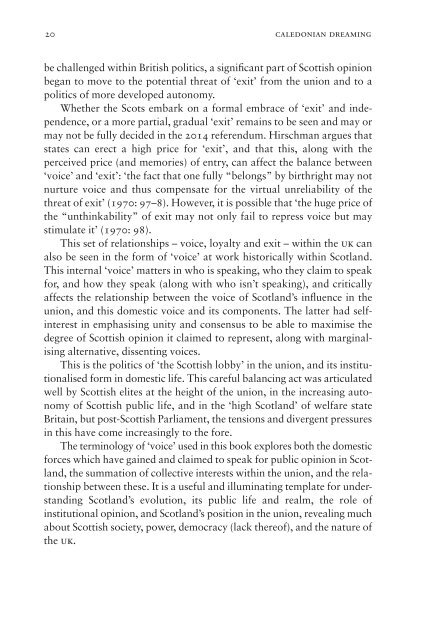Caledonian Dreaming by Gerry Hassan sampler
Caledonian Dreaming: The Quest for a Different Scotland offers a penetrating and original way forward for Scotland beyond the current independence debate. It identifies the myths of modern Scotland, describes what they say and why they need to be seen as myths. Hassan argues that Scotland is already changing, as traditional institutions and power decline and new forces emerge. He outlines a prospectus for Scotland to become more democratic and to embrace radical and far-reaching change.
Caledonian Dreaming: The Quest for a Different Scotland offers a penetrating and original way forward for Scotland beyond the current independence debate. It identifies the myths of modern Scotland, describes what they say and why they need to be seen as myths.
Hassan argues that Scotland is already changing, as traditional institutions and power decline and new forces emerge. He outlines a prospectus for Scotland to become more democratic and to embrace radical and far-reaching change.
You also want an ePaper? Increase the reach of your titles
YUMPU automatically turns print PDFs into web optimized ePapers that Google loves.
20 caledonian dreaming<br />
be challenged within British politics, a significant part of Scottish opinion<br />
began to move to the potential threat of ‘exit’ from the union and to a<br />
politics of more developed autonomy.<br />
Whether the Scots embark on a formal embrace of ‘exit’ and independence,<br />
or a more partial, gradual ‘exit’ remains to be seen and may or<br />
may not be fully decided in the 2014 referendum. Hirschman argues that<br />
states can erect a high price for ‘exit’, and that this, along with the<br />
perceived price (and memories) of entry, can affect the balance between<br />
‘voice’ and ‘exit’: ‘the fact that one fully “belongs” <strong>by</strong> birthright may not<br />
nurture voice and thus compensate for the virtual unreliability of the<br />
threat of exit’ (1970: 97–8). However, it is possible that ‘the huge price of<br />
the “unthinkability” of exit may not only fail to repress voice but may<br />
stimulate it’ (1970: 98).<br />
This set of relationships – voice, loyalty and exit – within the uk can<br />
also be seen in the form of ‘voice’ at work historically within Scotland.<br />
This internal ‘voice’ matters in who is speaking, who they claim to speak<br />
for, and how they speak (along with who isn’t speaking), and critically<br />
affects the relationship between the voice of Scotland’s influence in the<br />
union, and this domestic voice and its components. The latter had selfinterest<br />
in emphasising unity and consensus to be able to maximise the<br />
degree of Scottish opinion it claimed to represent, along with marginalising<br />
alternative, dissenting voices.<br />
This is the politics of ‘the Scottish lob<strong>by</strong>’ in the union, and its institutionalised<br />
form in domestic life. This careful balancing act was articulated<br />
well <strong>by</strong> Scottish elites at the height of the union, in the increasing autonomy<br />
of Scottish public life, and in the ‘high Scotland’ of welfare state<br />
Britain, but post-Scottish Parliament, the tensions and divergent pressures<br />
in this have come increasingly to the fore.<br />
The terminology of ‘voice’ used in this book explores both the domestic<br />
forces which have gained and claimed to speak for public opinion in Scotland,<br />
the summation of collective interests within the union, and the relationship<br />
between these. It is a useful and illuminating template for understanding<br />
Scotland’s evolution, its public life and realm, the role of<br />
institutional opinion, and Scotland’s position in the union, revealing much<br />
about Scottish society, power, democracy (lack thereof), and the nature of<br />
the uk.


















